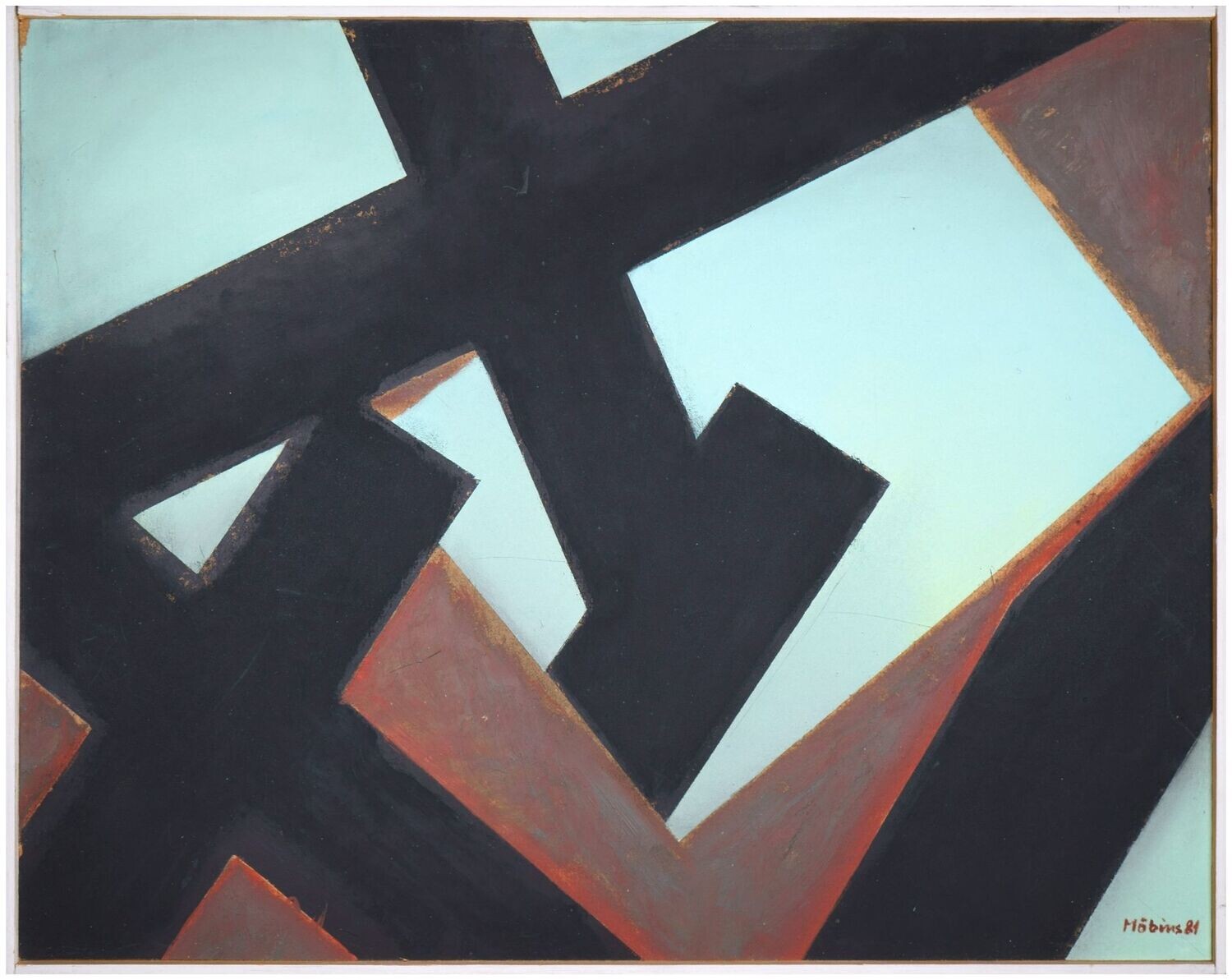Möbius, Jürgen (*1939 Großenhain), Tektonische Spannung, 1981
Jürgen Möbius(*1939 Großenhain), Tektonische Spannung . Öl auf Hartfaser, 47,5 x 60 cm, 49 x 61,5 cm (Rahmen), unten rechts mit „Möbius“ signiert und auf „[19]81“ datiert.
- Obere linke Ecke mit kleinem Ausbruch, leichte Kratzspuren und stellenweise etwas berieben. Provisorischer Galerierahmen mit Gebrauchsspuren.
Exposé als PDF
- Urformen der Malerei -
Das vor Augen stehende Formgefüge wird vom Bildrahmen überschnitten. Damit eröffnet der Rahmen nicht einen Raum, innerhalb dessen sich etwas präsentiert, vielmehr zeigt er den scheinbar willkürlichen Ausschnitt eines umfassenden Zusammenhangs, der sich als solcher gar nicht einrahmen lässt.
Wir sehen Formen, die in einem Spannungsgefüge zueinanderstehen, wobei die einzelnen, sich schier endlos über den Bildrahmen hinaus fortsetzenden schwarzen und braunen Formen bereits in sich eine Spannung aufweisen, da sie nicht einzig Formen, sondern zugleich auch Flächen sind – Formflächen, während der hellblaue Flächengrund zugleich Formen ausbildet, die als Flächenformen in Erscheinung treten. Die Formflächen und Flächenformen sind ineinander verschachtelt und bilden ein alle Elemente einbeziehendes Gefüge aus.
Durch die winkelförmige Anordnung der schwarzen und braunen Formflächen weist das Gefüge einen tektonischen Charakter auf. Daher wird die Spannung geradewegs ins Paradoxale gesteigert, indem die vorn präsente schwarze Flächenform im Bildzentrum von der darunter liegenden braunen Flächenform überschnitten wird, was im realen Raum unmöglich wäre. Gerade anhand dieses ‚Paradoxons‘ führt Möbius vor Augen, dass das Paradoxale innerhalb der Malerei Wirklichkeit ist. Es ist gleichsam die ureigenste Möglichkeit der Malerei, welche die Malerei von den anderen Künsten unterscheidet. Im Verbund mit der ebenfalls ursprünglich wirkenden tektonischen Ausformung schafft Jürgen Möbius eine archaische Urmalerei, die allerdings nicht mit dem autonomen Farb- und Formenkosmos des Suprematismus à la Kasimir Malewitsch zu verwechseln ist. Statt farblich homogener in sich perfekter Formen sind die Farben hier bewusst ungleichmäßig aufgetragen und in das Braun auf eine vom Pinselduktus bestimmte Weise das helle Blau hineingemischt worden. An den Rändern der Flächenformen scheint gerade aufgrund des unregelmäßigen Farbauftrags sogar das Holz der nicht grundierten Hartfaserplatte durch. Auf diese Weise veranschaulicht Möbius, dass es sich um Malerei handelt, die eben durch einen Akt des Malens geschaffen worden ist – einen Akt allerdings, der die Urprinzipien der Malerei ergreift und damit die Malerei als solche realisiert.
zum Künstler
Von 1959 bis 1965 studierte Jürgen Möbius Malerei am Mainzer Hochschulinstitut für Kunst- und Werkerziehung. Zudem absolvierte er ein Studium der Philosophie und Kunstgeschichte an der Universität Mainz. Anschließend war er in Mainz als freischaffender Künstler tätig.
Zunächst schuf Möbius Materialreliefs und Installationen, um sich dann, gegen 1974, verstärkt der Konzeptkunst zuzuwenden und filmische Mittel hinzuzuziehen. In dieser Phase verfasste er den manifestartigen Essay „Prinzipien der supranaturalen Landschaft" (1979).
Ab 1981 konzentriert sich Möbius auf die Malerei und sucht nach künstlerischen Wegen, in der „Verschmelzung von gegenständlichen und abstrakten Bildelementen, die intellektuelle und sinnliche Wahrnehmung als gleichwertig [zu] behandeln“ (Wolfgang Zemter). Inspirationen dazu gewinnt er auf seinen Studienreisen, die nach Thailand und Sri Lanka führen.
„[Die reine Malerei von Jürgen Möbius] flutet als zeitloser Ausdruck von Erinnerung und Energie durch uns hindurch, pflügt unsere Wahrnehmung und bringt uns das Glück des Sehens authentischer, unverrückbarer Form.“
- Philippe Büttner
Auswahl an Einzelausstellungen
1969 Galerie Würzner, Düsseldorf / Galerie Gurlitt, Mainz
1972 Städtische Galerie, Mainz
1973 Galerie Schloss Ringenberg Rathaus, Kleve
1974 Röderhausmuseum, Wuppertal
1976 Galerie Glasing, Osnabrück / Städtische Galerie, Herne
1977, 1997, 2004 Märkisches Museum, Witten
1979 Studio M, Bamberg / Staatstheater, Darmstadt
1980 Galerie Stolànovà, Wiesbaden / Mittelrheinmuseum, Koblenz
1982 Galerie Dornhöfer, Mainz
1984 Galerie Neumühle, Schlangenbad
1985 Landesmuseum, Mainz / Kunstverein, Ludwigshafen / Nassauischer Kunstverein, Wiesbaden
1986 Museum, Bochum / Galerie der Stadt Iserlohn
1987, 1990 Galerie Klaus Kiefer, Essen
1987, 2000 Galerie Ulrike Buschlinger, Wiesbaden
1988 Kunsthalle Darmstadt
1988, 1992, 1996, 1999 Galerie Leonhard, Basel
1992, 2002 Galerie Zulauf, Freisheim
1994 Galerie Remy, Vallendar
1995 Sendezentrum des Zweiten Deutschen Fernsehens, Mainz
2001 Collegium oecumenicum, Bamberg / MVB Forum für Kultur und Wirtschaft, Mainz
2006 Adam Gallery, London
Auswahl an Gruppenausstellungen
1969 ‘International Graphic Arts’, Galerie Dalléas Bordeaux, Paris
1975 ‘Deutscher Künstler-Bund’, Dortmund
1979 ‘Man and man’s Images’, Märkisches Museum Witten
1980 ‘Love-Dokuments of our Time’, Art Hall Darmstadt and Art Association Hannover
1982 ‘Work - Progress – Position’, Nassau Art Association Wiesbaden
1983 ‘Principle Hope – Utopic Aspects in Art and Culture of the 20th Century’, Museum Bochum
1986 ‘Selfportraits’, Gallery Klaus Kiefer Essen
1987 ‘The Dying and Death’, Gallery Klaus Kiefer Essen
1989 ‘Where are You, Revolution – Freedom, Liberty, Egality, Fraternity to-day’, Museum Bochum 1990 ‘Flight – a Problem within the Memory of Man’, Kunsthalle Darmstadt ‘Art and War 1939 – 89’, House of Cultures Berlin
1991 ‘Material and Form’, Pillnitz Castle Dresden and Pfalz Gallery Kaiserslautern
1995 20 Years Exhibitions, Chrämerhuus Langenthal, Schweiz
1998 ‘Works on Paper’, Klaus Kiefer Gallery Essen
2000 ‘Acquisitions 1900 – 2000’, Mittelrhein-Museum Koblenz
2001 ‘Strange Pictures’, Klaus Kiefer Gallery Essen
2002 ‘10 Years Buschlinger Gallery’, Buschlinger Gallery Wiesbaden
2004 ‘Eternal Space – Pictures and Sculptures’, Dome of Bamberg
2005 Art Fair Chicago, Adam Gallery, London
Auswahlbibliographie
Mittelrheinisches Landesmuseum (Hrsg.): Jürgen Möbius - Neue Bilder, Mainz 1985.
Kunstverein Darmstadt (Hrsg.): Jürgen Möbius. Bilder 1985 - 1988. Kunsthalle Darmstadt, 26. Juni - 14. August 1988. Red. Dorit Marhenke, Lyrik Marcus Schiltenwolf, Düsseldorf 1988.
Gabriele Prusko (Hrsg.): Jürgen Möbius. Mit Texten von Philippe Büttner und Ralph Mieritz, Basel 1992.
Wolfgang Zemter (Hrsg.): Jürgen Möbius - Aktuelle Arbeiten. Märkisches Museum der Stadt Witten, Bönen 1999.
Wolfgang Zemter (Hrsg.): Jürgen Möbius. Flieger in meinem Zimmer und Beruhigte Zone, Bönen 2004.
Dama Gallery (Hrsg.): Jürgen Möbius, London 2014.

